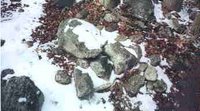
I get emails from Carl Masthay once in a while. Running a Google search about you might find:
“Carl Masthay, PhD (Linguistics), of Polish ancestry from Southington, Connecticut, a Chinese translator in the U.S. Air Force in the early 1960s, and a retired medical manuscript editor at Mosby, Inc., for 33 years, began early study of Algonquian languages stimulated by place-name study culminating in a 47-page monograph on Mahican-language hymns (1980) and 11 years of work on his 200-page Schmick's Mahican Dictionary, published by the American Philosophical Society in 1991 (http://www.puzz.com/kaskaskiadictionary.html).
Here’s just part of what he sent me just this morning:
“To all: A literal tree of Christmas and New Year’s greetings came to me with many errors, which I repaired as well as I could (red). I then added many more that I had been keeping for decades, more from a Web site (georgem@gapent.com) (black for Xmas; weak blue for New Years), more from North American Indians, and about 62 from within the borders of China (New Year’s only)(blue). It is BETTER to leave them in this file because of the special SILDoulos IPA93 font for the Chinese-territory ones. Do what you wish as the years proceed.
Carl Masthay, St. Louis, Missouri, USA, 3 March 2006.”
May there be good wishes to the inhabitants of the whole world.
Also see Merry Christmas (and) Happy New Year per georgem@gapent.com: http://www.etailersdigest.com/resources/christmas.htm combined with http://www.etailersdigest.com/resources/new_year.htm and corrected by Carl Masthay, St. Louis, Missouri, February 2006
Abenaki – Anhaldam mawi kasipalilawalan. (‘Forgive me for any wrong I may have done you.’ The tradition was to go from house to house on New Year's day speaking these words so that the new year can begin with a clean slate. Joseph Bruchac).
Alsacian German (France) – E gueti Wïnâchte (or for children: Chrischtkindelsnocht = Christ-child-little’s-night), un e glecklichs Nej Johr.
Alutiiq (Alaska) – Spraasnikam! [Russian: For the (happy) holidays].
Apache, Western (USA) – Gozhąą Késhmish.
Blackfoot (USA/Canada) – I'taamomahkatoyiiksistsikomi. [Merry big holy day]
Frisian (Netherlands) – Goede Krystdagen. Noflike Krystdagen en in protte Lok en Seine yn it Nije Jier! (‘Pleasant Christmas day and a lot of luck and blessings in the new year!’) Lokkich Nijjie.
Gaelic (Ireland) – Nollaig Shona. Blian Nua Faoi Mhaise Duit.
German – Herztlichste Weihnachtsgrüsse. Frohe Weihnachten! Fröhliche Weihnachten und ein glückliches Neues Jahr! Ein glückliches Neujahr.
Hawai’ian – Mele Kalikimaka ame (or ā me ka ‘and with the’) Hau’oli Makahiki Hou! ’O ke aloha Kalikimaka ia ’oe kekahi e Carl, a pela no ka hau’oli makahiki hou. Christmas greetings to you too, Carl, as well as wishes for a happy New Year.
Hawai’ian (USA) – Mele Kalikimaka ā me (ka) Hau’oli Makahiki hou.
Huron – Jesous ahatonhia. (Jesus is born. = Christmas) –
( Tim’s note: Bruce Cockburn recorded this song, in Hurón, on his “Christmas” CD in 1993 (http://www.brucecockburn.com/xmas.html). He claims in the liner notes that this is the oldest of North American Christmas songs: "Otherwise known as 'The Huron Carol', this is the first Canadian Christmas hymn. It was written early in the 1600s by the Jesuit Fr. Jean de Brebeuf, who acquired fame and martyrdom soon after when he was ceremonially barbecued by members of the Iroquois confederacy, who went on to virtually obliterate the Hurons and their culture. They were encouraged in this by British colonial interests who were after control of French claimed territory, much of which was traditionally Huron. Those of this latter tribe who survived the wars were mostly absorbed into Iroquois communities. A few, however, stayed with the French colonies. Their descendants inhabit a couple of villages in modern Quebec, but their language has largely been lost. Special thanks are due to John Steckley for his help as translator and pronunciation coach."
You can listen to the song, see the lyrics and a translation at: http://firstnationhelp.com/huron.html (with a downloadable MP3 of Native Vocal group))
Italian – Alegre Natal. Buon Natale e Felice Anno Nuovo. Buon Natale e Buon anno nuovo. Felice capo d’anno.
Japanese – Kiristo Kōtansai omedetō. キリスト降诞祭 おめでトう.Yoi Kurisumasu-o Oinori itashimasu. (‘Christ birthday-anniversary congratulations. Sending a respectful prayer for a good Christmas.) Kiristo no tanjōbi omedetō. Meri Kurisumasu. Akemashite omedetō gozaimasu. (‘[new dawn] breaking open polite congratulations’) 謹賀新年 Kinga Shinnen. (‘Respectfully celebrate the New Year.’ 2006年 = 平成18年, 元旦 Heisei jūhachi-nen, gantan)
Krio (Gambia) – Cheers dis Krismas Oo!
Lakota (N. Central USA) – Wanikiya tonpi wowiyuskin na Omaka Teca Oiyokipi.
Navajo (Diné) (SE US) – Merry Keshmish. Kasmish Bihozhi. or Yá’át’ééh Kéeshmish. Hozhi Naghai.
Osage (Internet Siouan font) – WahkóNta izhíNke iitáe ékitxaN. ÓweenaNpi. (‘God son he.was.birthed it.is.time.again we.are.grateful.’: ‘It is time again to celebrate Jesus’s birthday.’) OmáiNhka htséka okáshe dhiNké ni-pi-hkóNbra. (‘year new troubles none plural-you I.want’: ‘I want you to be in peace in the new year.’) e as in let; N = nasalized vowel.
Tuscarora – NayeNkwarihwatuk'eNhti ha? thwec'e:haws Y'e:suhs (‘It is holy to us, the birthday of Jesus’: Merry Christmas’). Eθachen'eN:tyeN? ha? awuhst'a:θe:? (‘that it make you happy the new year’) (c = c-háchek, 'e: = high-pitch accented long /e/, eN = nasal vowel, 'eN = high-pitch accented nasal vowel, 'eN: = high-pitch accented long nasal vowel, ? = glottal stop, θ = theta).”
If you’d like a complete copy of the “135-kilobyte e-mail document,” as Carl puts it, I could forward it to you. I find it interesting and sort of amazing.
Peace and Best Wishes to all who read this; my mom suggests that we all celebrate every holiday we can and I invite you to do the same!
Peace,
Tim
No comments:
Post a Comment